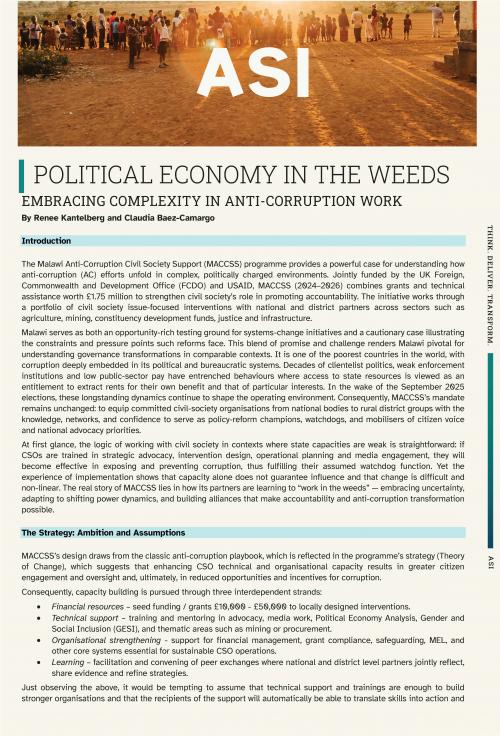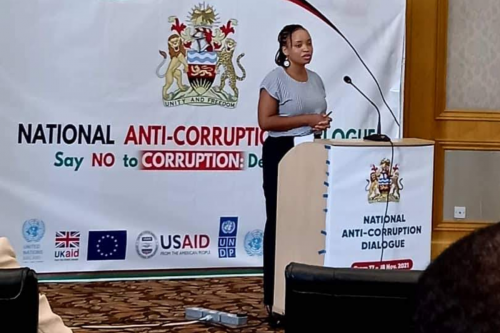Malawi recovers Cashgate property using non-conviction based forfeiture

Congratulations to our partners at the Anti-Corruption Bureau and the Office of the Director of Public Prosecutions in Malawi for achieving the final forfeiture of a house linked to the infamous Cashgate corruption scandal.
A decision by the Supreme Court to reject an appeal against the forfeiture order sends an important message about ending impunity for high-profile corruption.
It is also an important marker of the tenacity and determination of our partners at the Malawi Anti-Corruption Bureau and other agencies to use all available legislation to pursue corrupt individuals and recover assets for the benefit of the Malawian people.
The case
The house – valued at MK 690 million or just under USD 400,000 – had been put up as security for bail by former Ministry of Finance budget director Paul Mphwiyo after he was charged with money laundering and theft in relation to Cashgate. Mphwiyo’s shooting in 2013 marked the outbreak of the scandal, which involved the alleged embezzlement of around USD 25 million dollars from the public treasury.
In addition to the house, Mphwiyo also paid MK 10 million in cash as part of the bail agreement and surrendered his travel documents.
After Mphwiyo absconded to evade justice, the state made an application to have both cash and the house forfeited. The High Court’s ruling to forfeit the house was however appealed by Mphwiyo’s wife and a legal battle ensued.
On 6 December 2024, Malawi’s Supreme Court of Appeal dismissed the appeal against the forfeiture order, ruling that the High Court’s decision to forfeit the property was lawful. The property now belongs to the Malawian State.
The Supreme Court’s decision makes for strong jurisprudence, as it was taken by the Chief Justice and a full court of eight other judges. We expect this to translate into greater use of non-conviction-based forfeiture provisions in future corruption and asset recovery cases.
The value of non-conviction based forfeiture
In terms of asset recovery law, policy and practice, three important lessons can be drawn from this case.
First, this case demonstrates the value of non-conviction based forfeiture in achieving the recovery of assets linked to corruption or other crimes, even when a criminal prosecution cannot be achieved.
The forfeiture was achieved using non-conviction based forfeiture provisions in Malawi’s Penal Code.
Expert advisors from the Basel Institute’s International Centre for Asset Recovery (ICAR) have been working with officers from the Anti-Corruption Bureau and public prosecutors to consider non-conviction-based forfeiture provisions in both the Penal Code and the 2017 Financial Crimes Act in relevant cases.
The first successful use of non-conviction based forfeiture under the Financial Crimes Act by the Financial Intelligence Authority was in 2020 in relation to funds stolen from the Reserve Bank of Malawi.
Inter-agency cooperation through a dedicated taskforce
A second success factor was efficient inter-agency cooperation between the Anti-Corruption Bureau, Office of the Director of Public Prosecutions and other agencies.
Malawi set up a dedicated asset recovery taskforce in 2014 under the leadership of the Director of Public Prosecutions. The taskforce was mandated to investigate and prosecute Cashgate cases and to recover stolen assets. It has achieved this through a variety of means, ranging from criminal prosecutions to negotiated settlements.
ICAR promotes the development of such multi-agency taskforces to improve the efficiency of investigations and boost asset recovery. It also promotes effective inter-agency cooperation through multi-agency training programmes, such as one conducted in November 2024 for practitioners from the ACB, Financial Intelligence Authority, Office of the Director of Public Prosecutions and Judiciary.
Raising issues of gender and asset recovery
The case is also interesting in the context of debates about the gender-related impact of asset recovery. In this case, though the property belonged to Paul Mphwiyo, it was his wife who appealed as she and her children were living in the property.
The Court’s decision disregarded any interest that the wife had in the property and took the view that only the legal owner, Mphwiyo, could challenge the forfeiture order.
Consideration of the rights of women over assets that are legally owned solely by their husbands – as is still the case in many countries – is an issue in which jurisprudence is still to be developed.
What next?
The Anti-Corruption Bureau has indicated that the property may be used to house its offices, eliminating rental costs for the current premises and thus directly saving taxpayer funds.
We look forward to continuing our support to the Government of Malawi in its efforts to prosecute and prevent corruption and to recover stolen assets for the benefit of the Malawian people. Our International Centre for Asset Recovery and other teams have been working in Malawi since 2015 under the Tackling Serious and Organised Corruption (TSOC) programme of the UK Foreign, Commonwealth and Development Office.



